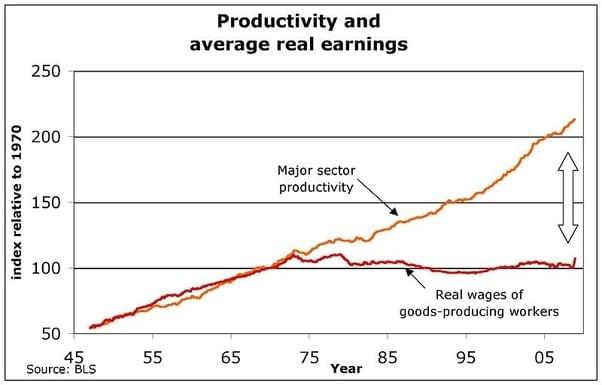How Can We Reach The Desirable State Where Most Work Is Done By Robots And Humans Work Short Hours At High Wages?
What most people don’t get is that “high wages” is subjective.
I could write a long paragraph here, but the gist is simple. Assuming we are speaking about the state of the art that is substantially different from what we live in today the “humans work short hours at high wages” statement is indistinguishable from some “what humans need and what is produced by robots costs virtually nothing”.
Simply put:
- A cup of coffee at some Starbucks, where the barista is a human. It was, is, and will remain expensive. Because it’s human labor, and, from my experience, the vast majority of people who are pro robots and automation are also pro shrinking the wage gap, reducing the Gini coefficient, and overall improving the equality of equity, not the equality of opportunity.
On a positive note: We kind of already are some half way to the world where humans work “short hours at high wages”.
It just requires some creative view of what short hours and high wages are.
Where pure market rules, such as better phones and computers, or such as trading your online time to bananas in countries that produce bananas, the world is already in good shape. Most people who are capable of getting some of their work done remotely are more or less in position to afford themselves enough food and shelter by moving to certain locations on our cozy planet, where some $150 a month would cover both easily.
Where governments and corporations rule the game, even with extreme automation, for a while from today we will be living in a world that is a lot like today’s.

Is car manufacturing an industry that is being automated as we speak? Hell yes. For many decades by now.
Consider a simple metric: a number of months a car factory worker has to work in order to afford a car they are assembling. Well, this metric didn’t quite go down; pretty much at all. With the trend towards automation, if we extrapolate from some 1970, this metric should be closer if not better than “one month one car” by today; but it’s not.
What I’m coming to with this story is that “short hours, high wages”, economically speaking, is not what the “ruling class” wants for us, humans. And I’m not making a value judgement here; I’m merely stating an observation. That’s why in the “developed” countries the costs of housing, education, or healthcare are and will remain extreme, so that even the top earners don’t feel like they can “work for a year or two more, and then chill for the next decade”. Admit it: had this been possible, and had enough people decide to take such a “career path”, our world might be on the verge of collapse today; so maybe, just maybe, it’s a good thing there are quite some forces that are making sure we, The People, keep working at about the same pace.
I can’t predict what the future will bring.
But the sustainable equilibrium appears easily attainable. As long as we don’t procreate like crazy, the worldwide trend of eradicating poverty and major diseases is well set up to continue.
Fewer and fewer humans would starve, thanks to many bits and pieces, robots and automation included. More and more humans would be in position to consciously choose a lifestyle where they can work fewer hours.
As for wages … well, as I’ve said above, don’t expect some multiplier to your (inflation-adjusted) “effective earnings” even if the robots to make it possible are widespread available tomorrow. Don’t expect the state of the art where healthcare/education/mortgage would suddenly stop bugging you. But do expect to have to worry less and less about the most basic things, such as water, food, basic medicare, powerful enough electronic gadgets, and Internet access.
Because this does align well with all three: with the state of the art in technology and engineering, with what most people want, and with what most governments and activists want people to have.
Why a Machine Learning Investment?
Dating Wine Using Nuclear Signatures
On Black Holes: Gateway to Another Dimension, or Ghosts of Stars’ Pasts?
Shedding Light on Dark Matter: Using Machine Learning to Unravel Physics’ Hardest Questions
Machine Learning on Condensed Matter Physics & Quantum Computing
Interview with the Inventor of Amazon's Alexa
Interview with Astronaut Scott Kelly
Aquaponics: How Advanced Technology Grows Vegetables In The Desert
The World Cup Does Not Have a Lasting Positive Impact on Hosting Countries
Lockheed Martin Confirms the SR-72 – Son of Blackbird Will Reach Anywhere in the World in One Hour
The Implications of Machine Learning on Condensed Matter Physics & Quantum Computing
Written by Dima Korolev
Dima Korolev is a Machine learning expert who has worked for many of the leading technology firms and has written extensively on technology's impact on the planet.